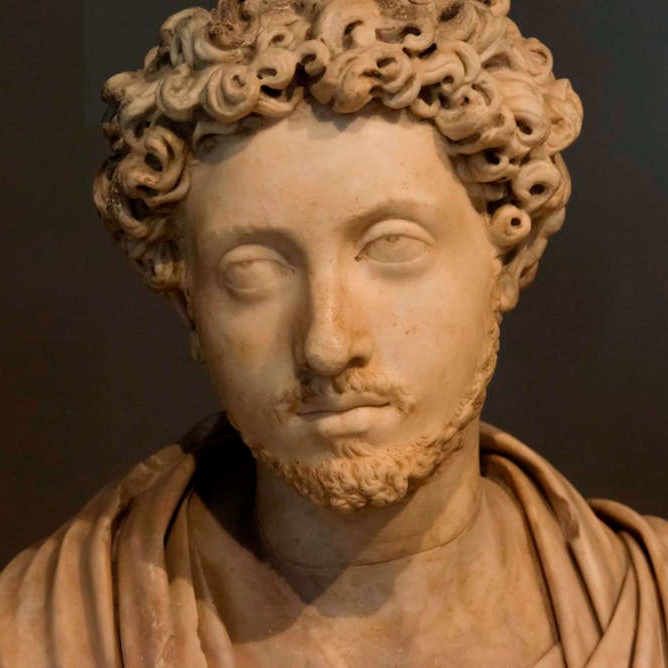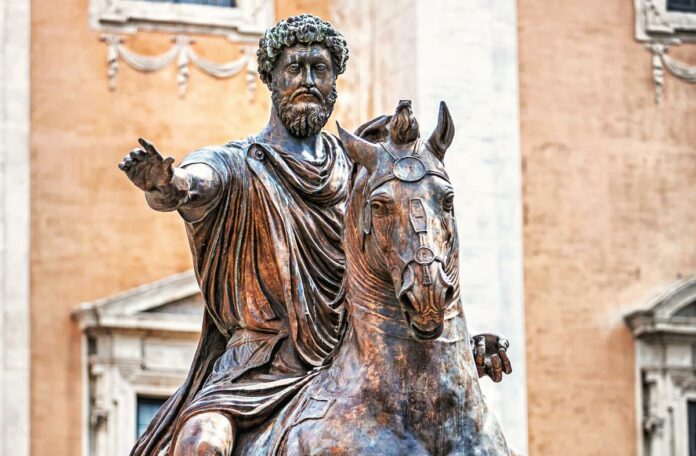Aerial view of the 2nd century Roman theatre at Aspendos, Antalya, modern-day Turkey. The theatre was built during the reign of the Roman emperor Marcus Aurelius (161-180 AD), and designed by a Greek architect Zeno, who was born in Aspendos.
Marcus Aurelius, the philosopher king. He created so much during his time, sad that his heir did not appreciate his father’s many gifts to humanity.
So grateful that Turkey did appreciate the history and maintained them to still be used and loved by people around the world.
The philosophy of Roman Emperor Marcus Aurelius can be found in a collection of personal writings called the “Meditations.” These works reflect the influence of Stoicism, particularly the philosophy of Epictetus, a renowned Stoic. The “Meditations” can be read as a series of practical philosophical exercises, adhering to the three fields of study of Epictetus, designed to absorb and apply philosophical theory into practice. The focus of these exercises is the concern with analyzing one’s judgments and the desire to cultivate a “cosmic perspective.”

From a modern perspective, Marcus Aurelius is certainly not ranked among the foremost ancient philosophers. He is not Plato or Aristotle, nor Sextus Empiricus or Alexander of Aphrodisias. To a certain extent, this assessment is entirely fair and reasonable. However, to evaluate the philosophical qualities that Marcus truly possessed and expressed in the “Meditations,” it must be emphasized that in antiquity, philosophy was not merely regarded as a matter of theoretical debate. Such arguments existed and were important, but they were framed within a broader conception of philosophy as a way of life. The aim was not only to achieve a rational understanding of the world but also to allow that rational understanding to shape the way one lived. If one keeps this understanding of ‘philosophy’ in mind, then one can appreciate the philosophical value in the “Meditations” of Marcus Aurelius.
Life
Marcus Aurelius was born in 121 AD. His early education was overseen by Emperor Hadrian, and he was later adopted by Emperor Antoninus Pius in 138 AD. After a period of studying rhetoric under the guidance of Fronto, Marcus later abandoned it to pursue the study of philosophy. Marcus Aurelius became emperor in 161 AD, initially alongside Lucius Verus, and later as sole emperor in 169 AD. Continuous attacks led to much of his reign being spent in the context of warfare, particularly in Central Europe. Nevertheless, he took the time to establish four Chairs of Philosophy in Athens, each for one of the four major schools of philosophy (Platonic, Aristotelian, Stoic, and Epicurean). He died in 180 AD.

The Meditations
Marcus Aurelius’ reputation as a philosopher is based on a single work, the “Meditations.” This work takes the form of a personal notebook and may have been written while Marcus Aurelius was campaigning in Central Europe, around 171-175 AD. The notes appear to follow no specific order and may simply be the original sequence in which they were written. The repetition of themes and clusters of quotations from various authors makes this impression clear. However, Book One is somewhat different from the rest of the collection and may have been written separately.
The earliest reference to the “Meditations” is recorded by Themistius in 364 AD. The current Greek title – “ta eis heauton” (“to himself”) – originates from a now-lost manuscript and may be a later addition (first noted around 900 AD by Arethas). The modern text mainly derives from two sources: a manuscript currently in the Vatican and the lost manuscript (mentioned above), on which the first printed edition in 1558 was based.
Apart from the “Meditations,” a portion of correspondence between Marcus Aurelius and Fronto, his rhetoric teacher, possibly written from an earlier period in Marcus’ life (around 138-166 AD), was discovered in the form of a palimpsest in 1815. Although this intriguing discovery has shed some light on Marcus Aurelius as an individual, it adds little to our understanding of his philosophy.
Philosophy
Stoicism
Marcus Aurelius was a Stoic. His ancient biographer, Julius Capitolinus, described him as such. Marcus Aurelius also mentions several Stoics he was taught by and particularly refers to Rusticus, from whom he borrowed a copy of Epictetus’ works. However, nowhere in the “Meditations” does Marcus explicitly call himself a Stoic. This may simply reflect the possibility that Marcus was writing more for himself than trying to define himself to an audience. However, it is fair to acknowledge that Marcus Aurelius was at least open to ideas from other philosophical traditions, impressed by Stoicism but not merely an unthinking disciple of it.

Influence of Epictetus
As mentioned, it is clear that Marcus Aurelius was familiar with the Discourses of Epictetus, frequently quoting them. The reputation of Epictetus in the second century is noted by several ancient sources, praised as the greatest Stoic and more famous than Plato. If Marcus felt drawn to Stoicism, Epictetus would certainly stand out as the most important Stoic of his time. Thus, it is perhaps reasonable to turn to Epictetus to explore the philosophical foundation behind the “Meditations.”
Philosophical Exercises
The “Meditations” certainly do not present philosophical theories similar to those found in the surviving works of Aristotle. They are also not comparable to a theoretical treatise such as the “Elements of Ethics” by the Stoic philosopher Hierocles, possibly a contemporary of Marcus Aurelius. However, the “Meditations” are fundamentally still regarded as a philosophical text. As noted, the “Meditations” is a personal notebook, written by Marcus for himself and for his use. They do not constitute a theoretical treatise designed to argue for a specific doctrine or conclusion; their function is different. To understand this function, it is necessary to introduce the concept of philosophical exercises (askêsis).
In the “Meditations,” Marcus Aurelius engages in a series of philosophical exercises designed to internalize philosophical theories, transforming his character or ‘dyeing the soul’ in light of those theories, and thereby transforming his behavior and entire way of living. By contemplating philosophical ideas and perhaps more importantly writing them down, Marcus engages in a repetitive process, designed to train his mind in a new way of thinking. This process is entirely distinct from constructing philosophical arguments and serves a wholly different function. While the former involves creating a specific philosophical doctrine, the latter is a practical exercise or training designed to incorporate that doctrine into one’s regular behavioral habits. According to the description of the three types of philosophical training outlined by Epictetus, Marcus contemplates in the “Meditations” a mixture of ideas concerning physics, ethics, and logic. These written reflections form a second stage of philosophical learning necessary after the study of philosophical theories. By engaging in such written philosophical exercises, Marcus attempts to transform his inner soul or character, thus changing his behavior. Therefore, the second stage of philosophical learning is a process by which a trainee philosopher trains himself to practice the theories, thereby progressing toward wisdom.
Cosmic Perspective
Among all the philosophical exercises in the “Meditations,” the most prominent ones revolve around what might be called the ‘cosmic perspective.’ In several passages, Marcus Aurelius encourages himself to transcend the limited perspective of the individual and experience the world from a cosmic viewpoint. For example:
“You have the power to strip away many superfluous troubles located wholly in your judgment, and to possess a large room for yourself, embracing in thought the whole universe, to consider the eternity of time, and to reflect on the rapid change in the parts of each thing, how short is the time from birth to dissolution, and the void before birth and that after dissolution are equally infinite.”
In passages like this, Marcus alludes to several Stoic theories. For instance, here, the Stoic physics of flux inherited from Heraclitus is evoked. However, more importantly, there is a reference to the evaluation of judgment and the assertion that this is the source of human unhappiness. Following Epictetus, Marcus asserts that all attributions of good or bad are products of human judgment. As Epictetus said, what disturbs people is not events themselves but their judgments about those events. According to Epictetus’ epistemology (to the extent it can be reconstructed), the impressions a person receives and seems to reflect the nature of things are actually complex. They not only involve the perception of an external object but also an almost involuntary and unconscious judgment of value. This judgment is the product of one’s dispositions and mental habits. It is this composite impression that a person either agrees with or rejects, forming a belief. The task of the philosopher is to rigorously examine one’s impressions, ensuring that one does not agree with impressions (i.e., accept as true) that include any unjustified value judgments.
Marcus Aurelius’ personal reflections in the “Meditations” can be read as a series of written exercises aimed at analyzing his own impressions and rejecting his unjustified value judgments. For example, he reminds himself:
“Say to yourself what you say to yourself: Do not add any more to the first impressions. […] Always adhere to the first impressions and do not add anything from within yourself.”
These “first impressions” are the impressions before any value judgment has been made. For Marcus Aurelius, human happiness (eudaimonia) entirely depends on accurately considering one’s impressions and judgments. For once one overcomes false value judgments—that wealth and social status have value and that one should compete for them before others, for example—one will experience the universe as a single living entity (identified with God) rather than a place of conflict and destruction. As Cicero presented in his summary of Stoic physics:
“The different modes of limited existence may meet with many external obstacles that hinder their perfect realization, but nothing can frustrate Nature as a whole, for Nature encompasses and contains within itself all modes of existence.”
It is for this purpose—to cultivate an experience of the universe as a unified living being identified with God—that the philosophical exercises in the “Meditations” are directed.
Conclusion
From a modern perspective, Marcus Aurelius is certainly not ranked among the foremost ancient philosophers. He is not Plato or Aristotle, nor Sextus Empiricus or Alexander of Aphrodisias. To a certain extent, this assessment is entirely fair and reasonable. However, to evaluate the philosophical qualities that Marcus had and expressed in the “Meditations,” it must be emphasized that in antiquity, philosophy was not merely regarded as a matter of theoretical debate. Such arguments existed and were important, but they were framed within a broader conception of philosophy as a way of life. The aim was not only to achieve a rational understanding of the world but also to allow that rational understanding to shape the way one lived. If one keeps this understanding of ‘philosophy’ in mind, then one can appreciate the function and philosophical value of the “Meditations” of Marcus Aurelius.




